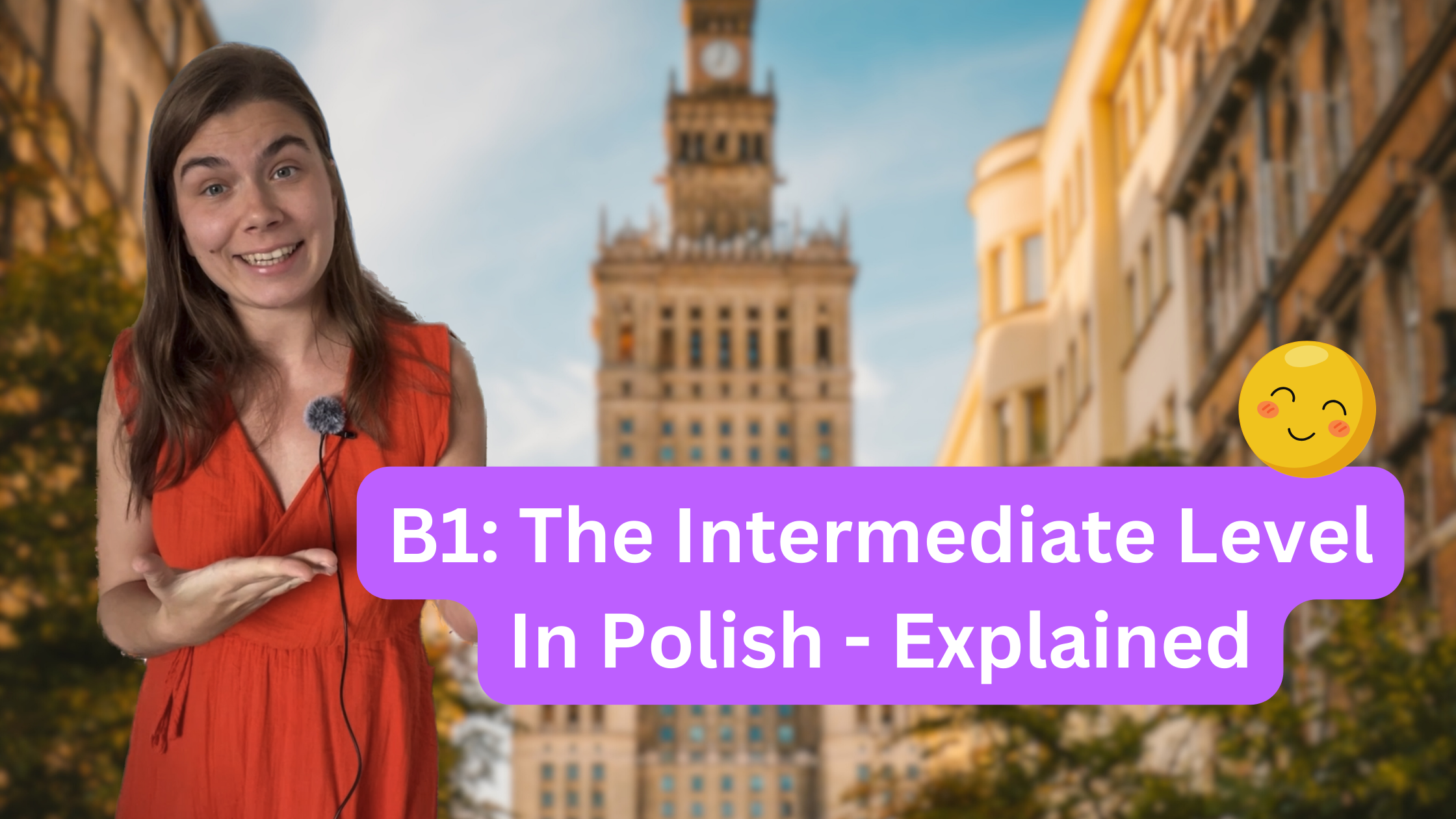What do you need to know in Polish at the Intermediate level (B1)?
November 22, 2023 | by completepolishcourse@gmail.com

Many foreigners aim to achieve a B1 level in Polish and the reasons behind this are very simple. Achieving this level is the key to speaking Polish fluently and opens doors for a permanent residency card in Poland. In this article, we’ll cover what a B1-level course should teach you.
What a B1 level Polish course should cover?
Let’s explore what exactly is being covered at the B1 level in Polish.
Nouns on B1 level in Polish:
- Revision of the conjugation of nouns and adjectives through all cases in both singular and plural:
- Conjugation of nouns in masculine gender ended by a consonant like: Włoch, malarz
- Conjugation of nouns in masculine gender ended by a vowel -a and -o, like: kolega, Jasio, tato
- Conjugation of nouns in femenine gender ended by a vowel -a, or -i like: studentka, ładowarka, sprzedawczyni
- Conjugation of nouns in masculine gender ended by a consonant like: przyjaźń, miłość
- Conjugation of nouns in neuter gender ended by -o, -e like: koło, czoło, pole
- Conjugation of nouns in masculine gender ended by -um like: centrum
- Conjugation of irregular nouns like: przyjaciel, człowiek, dzień, tydzień
- Irregular nouns conjugation like dziecko, dzień, tydzień, rok, ręka, przyjaciel, człowiek, brat
- Conjugation of names ending with -y and -i like Maurycy, Jerzy, Antoni and surnames ending with -ski, -cki, -ska, -cka like Kowalski, Wiśniewski, Nowacka
- Conjugation of adjectives like chory, znajomy (We also cover at A1 level the basics)
- Functional conjugation of nouns like imię (imi-eni-a) and zwięrzę (zwierzęci-a, zwierzęta)
- Alterations of vowels and consonants in the subject like: fotel–a, córk–ę,
- Subject and the ending: pol-a, kościół: kościoła
Pronouns at the B1 level in Polish:
- Conjugation of pronouns in both singular and plural through all cases:
- Personal pronouns by all cases: ja, ty, on, ona, ono, my, wy, oni, one, państwo, pan, pani (reminder)
- Demonstrative pronouns in all cases: ten, ta, to (reminder)
- Conjugation of the possessive pronouns through all cases like: mój, moja, moje, twój, twoja, twoje, nasz, nasza, nasze, wasz, wasza, wasze (reminder)
- Interrogative pronouns: Kto? Co? as well as Jaki? Jaka? Jakie? and Który? Która? Które?, Czyj? Czyja? Czyje? through all cases (reminder)
Intermediate Polish Adjectives & Numerals:
- Conjugation of adjectives in both singular and plural by all cases:
Reminder:
- Conjugation of masculine adjectives ending with -y/-i like: miły, gorzki
- Conjugation of feminine adjectives ending with -a like: miła, gorzka
- Conjugation of neuter adjectives ending with -e like: miłe, gorzkie (we cover in A1 level as well)
Conjugation of numerals by cases:
- Main numerals in Nominative: jeden, jedna, jedno, dwa, dwie, siedem (without personal masculine gender)
- Adjective conjugation of ordinal numbers in all cases in singular: pierwszy, pierwsza, pierwsze, drugi, druga, drugie, dziewiąty, dziewiąta, dziewiąte
Cases you need to know at the B1 level in Polish:
Nominative Case:
Singular and Plural (including nouns in masculine personal gender) – Revision
- When it has a functional subject like: Chłopak idzie drogą.
- When it has a function of predication like: Moi znajomi to prawnicy.
Genitive Case:
Singular:
- Direct object after the negated verbs: Nie znam tego człowieka.
- Genitive as a direct object: Szukam podręcznika
- Genitive as an indirect object: Boję się pająków.
- Genitive as an affiliation: To jest telewizor babci.
- Genitive in measures and quantity: Poproszę butelkę wina i paczkę papierosów.
- Genitive after the numerals (5+, without masculine personal gender) like: Mamy 50 komputerów.
- After the prepositions: u, z(e), dla, do, od(e), obok, bez(e) like: Pojadę z Wrocławia do Gdańska.
- Genitive in dates where we talk about the day, month and year like: Marta urodziła się dwudziestego sierpnia tysiąc dziewięćset dziewięćdziesiątego trzeciego roku (20/07/1993)
- Other uses covered on the A2 level
Dative Case:
In both singular and plural (Reminder of A2 level)
- Personal pronouns in Dative like: Bardzo mi się podoba twoja bluzka!
- Animate nouns as an indirect object like: Daliśmy tej dziewczynie czekoladki.
Accusative Case:
In both singular and plural. (Reminder of A2 level)
- As a direct object after the transitive verbs: Przygotowuję ciekawą wystawę w centrum Wrocławia.
- After the prepositions: na, po, w(e), przez(e), o, za: like: Przeszliśmy przez skrzyżowanie. Idę na pole. Wydarzenie odbędzie się w środę.
Instrumental Case:
Both singular and plural (Reminder)
- To describe a person after the verb “To Be” (Być) & “Zostać” (To become): Miśka jest psychologiem, Oni są znanymi modelami, On jest prawnikiem, Zostanę neurologiem.
- The function of the indirect object after the verbs such as: Interesować się, Martwić się, Opiekować się, Zajmować się
- The function of the indirect object with means of transport: Płynę motorówką, a mama jedzie pociągiem. Interesuję się pływaniem.
- After the prepositions: z(e), za, nad(e), pod(e), przed(e), między: Książka jest pod stołem, Lustro wisi nad zlewem. Mama stoi przed domem.
Locative Case:
Both singular and plural (Revision)
- After prepositions indicating a place like: na, w(e), przy: Spotkamy się na dworcu, Siedzę na fotelu. Założyłem fundację w Krakowie.
- After prepositions indicating time of the activity: w, po, o: Będę we Wrocławiu w przyszłym tygodniu, Spotkajmy się o siedemnastej, Będę we Wrocławiu w przyszłym tygodniu.
- After prepositions indicating month or year: Moje studia zaczynają się w październiku.
- After prepositions indicating an object: Myślę o szkole. Marzę o wakacjach.
Vocative Case:
Revision in both plural and singular. Like: Madziu! Szanowni Państwo, Panie profesorze! Drodzy uczniowie! Chodź tutaj proszę!
What verbs do you need to know to be B1 in Polish?
Everything you need to know on A1 in Polish and additionally:
- Infinitive verbs: like kierować, składać (Revision – A2)
- Rection of the verb: używać telefonu, przyglądać się mamie, wziąć urlop, opiekować się kotem, myśleć o sprawdzianie, płynąć statkiem (Revision – A2)
- Subject of the Present: Brać, Biorę, Bierz (Revision – A2)
- Subject of the Past: Brać, Brał, Brałbym (Revision – A2)
- Conditional: As a form of wish, request, mild order: Chciałbym pójść do kina. Czy mógłbyś pożyczyć mi długopis? Czy moglibyście mówić ciszej?
- If-clauses: Gdybym była wysoka, to byłabym modelką. Gdybym się uczyłm, to teraz lepiej mówiłbym po polsku.
- The verbs of movement (Revision): iść/chodzić and pójść/jechać/jeździć/pojechać like: Codziennie jeżdzę do pracy samochodem, ale dzisiaj pojadę tramwajem. Chodzę na lekcje polskiego 2 razy w tygodniu.
Revision of:
- The conjugations: -ę, -esz like: biorę – bierzesz or -ę, -isz/-ysz: wezmę – weźmiesz and -am, -asz / -em/-esz like cieszę się – cieszysz się, leżę – leżysz
- The perfective and imperfective verbs like: kraść/ukraść, pragnąć/zapragnąć, piec/upiec, kłamać/skłamać
- The Present: Magda zajmuje się dzieckiem w domu.
- The Past (perfective/imperfective): Długo uczyłem się polskiego, ale w końcu się nauczyłem!
- The Future tenses: Będę chodziła na lekcje hiszpańskiego co piątek. Pójdę na lekcję hiszpańskiego w piątek. Studenci będą szli do teatru na sztukę. Będziemy się spotykali co piątek.
- Imperative (Revision): Zadzwoń do babci! Nie pisz z nią! Jedz dużo warzyw!
- Conditional: As a form of wish, request, mild order: Chciałbym pójść do kina. Czy mógłbyś pożyczyć mi długopis? Czy moglibyście mówić ciszej?
- Non-finite form: można, trzeba, wolno, warto, należy (Revision)
- Verbs of movement: iść / chodzić / pójść / jechać / jeździć / pojechać
We also learn the word formation:
- Gradation of adverbs & syntactic use of the grades in 0 and 1:
Różowy → Bardziej różowy. Jej pokój jest bardziej różowy niż ten.
Wysoki → Wyższy. Maciek jest wyższy od Kuby.
- The syntactic function of adverbs like
Fantastyczny → Fantastycznie
Wyglądasz fantastycznie.
- Adverbs gradation and their syntactic use:
0 and 1
Maciej pije tak dużo jak Adam. Kasia pływa szybciej od Rafała. Hania mówi bardziej interesująco niż Józia.
- Revision of the names of the inhabitants and adjectives from countries like: Polska – Polak – polski
- Femenince forms (functional use) Revision: kelner → kelnerka
- Names of the activities like tańczyć → tańczenie
Conclusion
Reaching the B1 level in Polish marks a huge milestone in your language-learning journey. Reaching a B1 level means speaking Polish fluently, on a high level enough to understand Polish dialogues, getting a Polish permanent resident card, and getting a job in Poland. After mastering all these fundamentals you will transform yourself into a confident Polish speaker.

Do you want to be B1 in Polish?
Dive into my easy-to-follow, pre-recorded course “Explorer to Mastery“ covering an entire A2 and B1 level. Enjoy lifetime access to learn at your own pace, revisit concepts whenever you need to, and start your B1 journey today.
Ready to open the doors to fluency in Polish? 🚀
GET INSTANT ACCESS and start your journey to fluency!
Happy learning!
RELATED POSTS
View all



